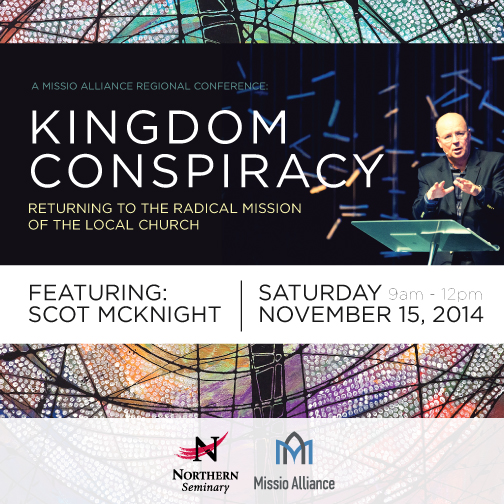 I was fortunate enough to receive a pre-pub copy of Scot McKnight’s new book Kingdom Conspiracy: Returning to the Radical Mission of the Local Church (Grand Rapids, MI: Brazos, 2014).
I was fortunate enough to receive a pre-pub copy of Scot McKnight’s new book Kingdom Conspiracy: Returning to the Radical Mission of the Local Church (Grand Rapids, MI: Brazos, 2014).
In a nutshell, McKnight argues that there are two predominant views of “kingdom” operating in and around evangelicalism. First, the skinny jeans view, which equates kingdom with social justice. Second, the pleated pants view, where kingdom equates to God’s redemptive work. McKnight wants to affirm the good of social justice work and the necessity of proclaiming salvation to the lost, but he wants to bring kingdom in closer proximity to church. The problem is that Protestants are absolutely paranoid about drawing kingdom and church together, cause, you know, that’s what Catholics believe. So McKnight begins his case arguing that analytically the very idea of a “kingdom” is that of a people ruled by a king.
This promotional video is a good summary of the argument:
Let me say that I think this is a tremendously useful book. He forces people to think and re-think what kingdom is how it applies to the local church. It also dispels the view that non-Christians do “kingdom work” by their philanthropic works. Hence Scot’s words: “It is good to seek the common good, but not at the expense of personally surrendering to King Jesus. If the kingdom story is the true story, in fact, there is no good for the common good until humans surrender to King Jesus” (p. 37). Also a good summary of his view is that: “When Jesus said the kingdom has drawn near, he meant we are about to see a new king governing a new people – that people will be marked by salvation and justice, but it is a people first and foremost” (p. 74). Or even shorter, “kingdom mission is first and foremost church mission” (p. 95). On top of that Scot plugs in some great quotes from Elizabeth Achtemeier (p. 23) and Gerhard Lohfink (p. 74).
I do have a few reservations here and there. In several places Scot gets his anabaptist on with a church as entirely separate from the state. So he says, “I speak directly now: we kingdom people don’t need the state, we don’t need the majority, and we must refrain from equating victory in teh world with kingdom mission. We have a story to live and to tell, and that story is the kingdom story. The culture war story is not the kingdom story, and it is idolatrous when Christians equate the two” (p. 102). To that I say, “yes, but.” Merely Christanizing a country with Christian laws is not kingdom, but I think this separationist view sounds a bit like the Essenic model of the kingdom as “Holy Withdrawal” (see pp. 50-51). Scot is aware of the criticism (see p. 111), but I’m not yet convinced he’s balanced separation of church and state with faithful presence, but maybe I need to have a closer read.
Some of us in the Aussie Biblical Theology tradition will be quite comfortable with what Scot is saying. Cause we Aussies have this bloke called Graham Goldsworthy who has taught nearly two generations that God’s kingdom is “God’s people, living in God’s place, under God’s rule.” See his various books like According to Plan and Gospel and Kingdom or else see this website for a quick overview. While I think that “kingdom” is fundamentally about God’s redemptive reign, that reign is always embodied in people and even extended by people. So there is a concrete relationship between kingdom and church even if church does not exhaust the meaning of kingdom.
If you are thinking about how to say when you preach on “kingdom” from Mark 1:14-15 or Rom 14:17, then this book will help you. If you are wondering what kingdom looks like or should look like in your local church, this book will be a great tool to chew through the issues. Any way, in the very least, you have to read the final chapter of the book where Scot lists fourteen “kingdom theses.”
My only remaining questions for Scot are:
1. How does the kingdom relate not just to the local church, but to the church universal?
2. How do para-church organizations relate to the kingdom since they are not exactly churches (esp. in light of p. 122 where para-church is not an adequate substitution for the church)?
3. While it is right to bring together God’s rule with God’s people, what is the danger of over-playing the connection?
4. What would you say to Peter Leithart about his book Defending Constantine in light of your anti-Constantine excursus?
Let me add that I reckon a three way conversation with Wright, McKnight, and Leithart on “kingdom” would be a great event if Brazos is brave enough to put it on!
Note also this event sponsored by Missio Alliance at Northern Seminary on 15 Nov 2014.












